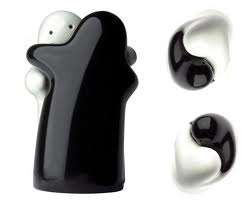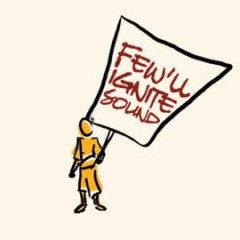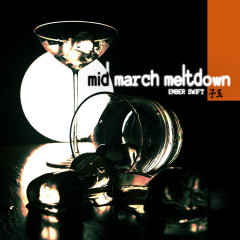Salt & Pepper
 We were sitting in a vegetarian restaurant talking, me with my dictionary in my hands and him with his patience and sparse smattering of English words for linguistic emergency. He was explaining the core meaning of the Tai Chi Yin-Yang symbol to me. He grabbed the salt & pepper shaker from the table. (These are rare on Chinese tables, but this place was frequented by foreigners.)
We were sitting in a vegetarian restaurant talking, me with my dictionary in my hands and him with his patience and sparse smattering of English words for linguistic emergency. He was explaining the core meaning of the Tai Chi Yin-Yang symbol to me. He grabbed the salt & pepper shaker from the table. (These are rare on Chinese tables, but this place was frequented by foreigners.)
“This is me and this is you,” he said passing me the pepper and keeping the salt on his side of the table. “why-eye-teh = man; Bah-la-keh = woah-men.” (The English words, white, man; black, woman gain syllables when spoken with a Chinese accent.) Then he added in Chinese, “yin, the black one, is female and yang, the white one, is male, but they fit together,” and he drew an invisible yin/yang symbol with his finger on the tabletop as though I had never seen it before.
“I know, I know,” I said quickly and a little impatiently. I have a university degree in this stuff, remember? That was my frustrated thought and then I felt guilty for not giving his ancient symbol some space. I decided to talk gender politics.
“But men and women are the same.” (I didn’t know the word for equal.)
His forehead creased. “But we’re not the same. We are totally different.” Pause.
This, of course, pricked the wrong nerve in my feminist armour and I said in my stammering Chinese, “I know we’re not the same, but we’re both people, so, men and women are the same when they are the smallest child,” I mimed rocking a newborn for clarity, “and then when they are children their fathers and mothers are different to boys and are different to girls, but I think they’re still the same in here,” and I point to my middle, just above my stomach, to try to convey the idea of “core.”
Wow. Here’s what I would have said if this were my first language: I believe that men and women are ultimately the same at their core but they are socialized to be different and therefore it creates a dichotomy between men and women throughout society.
He understood my point, though. He has never judged my intelligence by the size of my words.
I looked up the word for equal and he waited patiently. “平等 Pingdeng” and then I repeated my point: “Men and women are equal.” I shut the dictionary for punctuation.
“Men and women are not equal. Salt and pepper are not equal. They are different. They are equally important but they are not equal to each other the way 1 equals 1. This is 1 and this is 2,” he said, pointing out the different shakers, “How can 1 equal 2? They are different things. Yin and Yang, though, are in balance with each other. These are two distinct ideas.” He placed one on each palm like his hands were trays of an old-fashioned scale. “Without one, there is no peace, like the Tai Chi symbol cannot be a complete circle without both the black and the white. It’s about balance, not equality.”
I had to look up the word distinction (差异 chayi/ 区别 qubie) and balance (平衡 pingheng) before I caught up to him. He waited then repeated his final points so that I could hear it again with the new vocabulary words.
I felt my gender view slipping. I wasn’t sure if I understood the concept of what he was saying and just struggling with the language, or if I was struggling with the concept from that perspective and shouldn’t be blaming my language skills. Obviously, when anyone says that men and women aren’t equal in any language, my “equal rights alarm bell” goes off. I tried to see what he was saying from a larger, philosophical perspective but I was defensive to be having a conversation about gender without the tools of my language at my side, my queer community, proof of my academic background, etc.
The truth is that I don’t believe biological sex determines gender. I don’t believe men and women need to be together for balance in the world. Was this what he was saying? I hoped not. And, globally, men and women aren’t yet living lives with equal opportunities, especially in China.
He saw me recede. “You think too much,” he says. “You think too little,” I snapped back quickly. He laughed, “You’re right. I do things without thinking a lot. But you don’t use your heart enough, I think. We’re like this salt and pepper, opposite and in balance. Now, you don’t think mind and heart are equal too, do you?”
I made a face.
The truth is, I had never thought about gender in this way before. Regardless of which biological sex we team up with or are born into, perhaps our gender identities are always seeking balance through our partnerships. I certainly know that my female ex-partners and I expressed gender differently and found compatibility in our differences. Not the same, but in balance. Equally important, but not equal.
“I’m talking about Tai Chi,” he said. Right. I had made the conversation about gender. He had just referenced it. Maybe there was an innate difference between men and women after all. At the time that this conversation happened, I still wasn’t sure about that. I gathered the salt and pepper shakers and returned them to their original positions. Tabled, until later.
That night, I dreamed in black and white. I was swirling.







